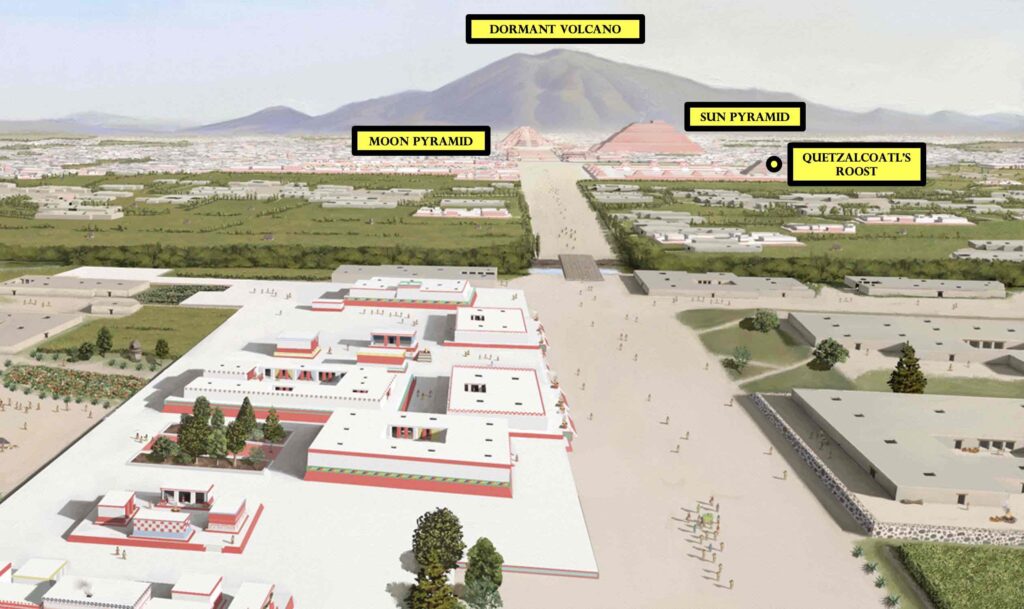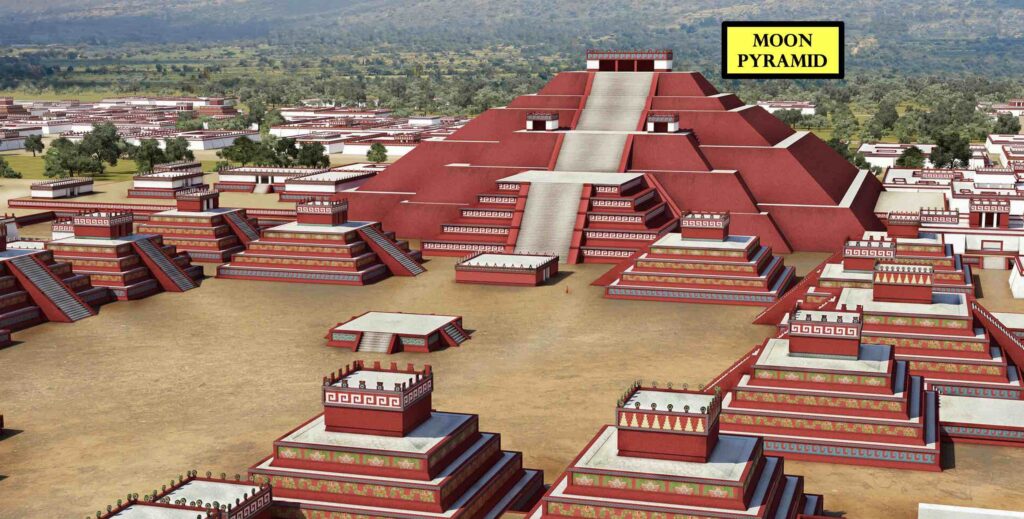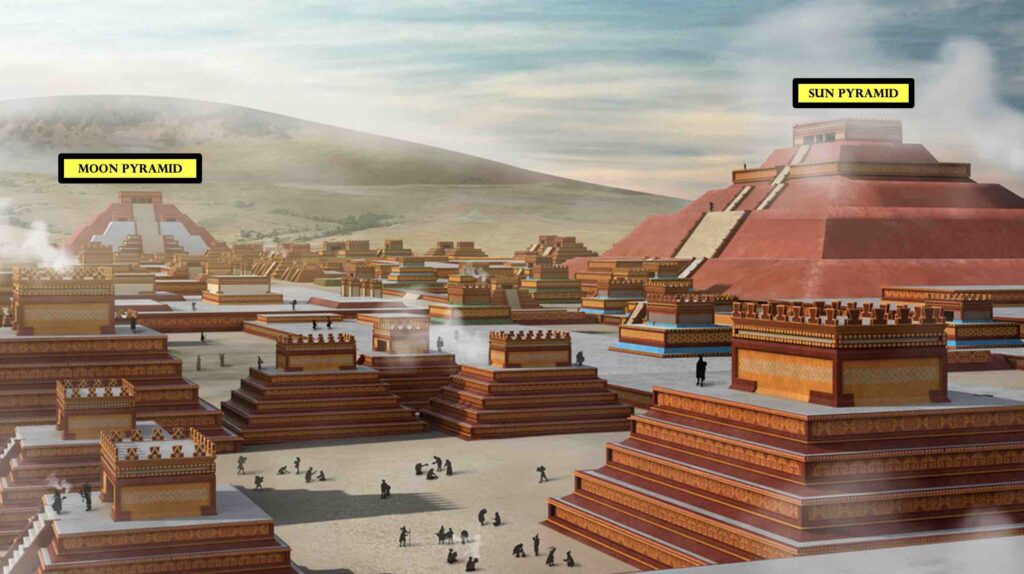Your mind in a daze, you struggle to comprehend the events of the past several days. One moment you were out back feeding the family pig, the next moment your entire family lay butchered and strewn about your thatched mud hut. Fires were everywhere, choking your lungs with black smoke. You tried to run away into the forest, but a crazed man soaked in blood and sweat tackled you to the ground, growled into your ears, and quickly bound your wrists behind your back as you squealed out for mercy. Then something struck your head and all went black. Sometime later, you were brought back to your senses with a hard kick to the ribs. But when you opened your pus-encrusted eyes, the scene was now totally different from anything you had ever known. Instead of a bucolic village by the coast, your horizon was now defined by intimidating structures of stone: walls, houses, temples, and—most incomprehensible of all—pyramids that seemed to rise up to touch the clouds themselves. They seemed nearly as massive as a dark volcano whose silent shadow enveloped them all.

It was the sight of the pyramids, however, that made your heart sink—for this could only be Teotihuacan, the “city of the gods.” No matter how isolated your village may have been, everyone for hundreds of miles away had grown up with chilling bedtime stories about the horrors that regularly took place at the distant metropolis of Teotihuacan. For the powerful gods of the city of stone required constant payment in blood for their blessing of the high priest’s dominion over the world. And that meant sacrifice—but not just any sacrifice. Quetzalcoatl, the insatiable feathered serpent, demanded the sacrifice of muscled warriors with their jawbone necklaces proudly adorned. Huehueteotl, the old fire god, would settle for nothing less than a thousand barrels of human blood, poured from raw stumps dripping out of newly severed limbs. Mictlantecutli, the inscrutable god of death, evinced an odd and twisted fetish: for him only wild animals, fierce predators like the jaguar and eagle or sometimes just a bucket of rattlesnakes, would do—and he insisted they all be buried alive. And then there was Tlaloc, the tempestuous storm god, who would not release the rains for agriculture until the hearts of hundreds of children flush in the prime of their youth had been cut out and held aloft on the summit of the Moon Pyramid as the sun reached its zenith on the summer equinox.

That, apparently, was your fate. Tied together one by one in a seemingly unending chain of sacrificial victims, you were led, slowly but surely, up the hundreds of stone steps to the Moon Pyramid. You tried not to think about what horrible end awaited you at the top of those steps, but the shrill screams and rivers of blood that coursed down the steps made this difficult. Nevertheless, it was clear that construction of the Moon Pyramid was not complete: the high priests of Teotihuacan were apparently enlarging it one section at a time, each addition increasing its height so as to rival the towering Sun Pyramid—completed many ages ago—behind you. And everyone knew that any alteration to a pyramid required new blood sacrifice to bless it. So this was to be the grim purpose of your life: to sanctify the enlargement of a pyramid by making it your tomb. What kind of god forces its worshippers to kill each other? Truly, the spirits of Teotihuacan are repugnant to all but the Teotihuacanos themselves.
And then—a miracle! As your bound hands were raised above your head and fastened to a pole at the end of a stone altar, a blood-soaked priest with glazed and vacant eyes appeared in your field of vision and lifted a jet-black obsidian knife above your chest. You clenched your eyes shut and prepared for the sharp stab of pain that would precede the tearing out of your heart, wondering which part of the cruel ritual would be harder to endure before you lost consciousness: the brutal plunge of the knife or the clumsy tearing out of your heart? And then, something wholly unexpected: the ground shook! The sharp stab of pain never came. Instead, after an excruciating pause during which your eyes remained clenched tight, a soft mournful wail from the priest, who dropped his obsidian blade on the pavement beside your altar. The drumbeats and trumpeting of conch shells, which had been constant for the entirety of the procession, suddenly stopped. Only the hissing and squawking of feral caged beasts could be heard now. What followed next was a blur. Out of the cacophony of voices and wailing that ensued you could only comprehend a bit: but that bit made you wish that the priest had finished the job on the altar of the Moon Pyramid. For the sign could not have been clearer: the Great Goddess of Teotihuacan had shifted the earth to announce Tlaloc’s preference not only for young hearts, but for young minds as well. Not all sacrificial victims could be eviscerated. At least one would have to be buried alive, with his or her mind and soul intact.
The two types of ceremonies, however, could not be completed together, for that would pollute the purity of each and anger the stern gods of Teotihuacan. So it was that your prone body was cut free from the stone altar and shoved into a wooden cage built for something that walked on four legs. Big burly warriors adorned with hideous necklaces strung with human jawbones lifted your crate and carried you down the hundreds of stone steps to the wide processional avenue that ran straight through the heart of the city. At some point they turned into a nondescript stone building and stacked your cage on top of many other cages inside a dark cramped room. In the darkness the sounds of wild animals were omnipresent: the hissing of pumas, rattle of rattlesnakes, squawking of golden eagles, and muzzled growling of jaguars. But not all your neighbors were wild carnivores: in the dim moonlight filtered in through the high open windows of the stone walls you could make out many other cramped human shapes in cages much like yours. Apparently you were not the only victim spared from the bloody altar for a fate worse than drowning. You were merely the one closest to a merciful escape when the ground shook.

Beyond all the cages stacked in rows and towers about you, you also spotted the dark outline of a doorway leading into another room—from which the raucous shouting of human voices suggested a small contingent of drunken guards just out of eyesight. As you began to process all these sights and sounds, one distinct from all the others reached your ears: the sound of crunching wood. The sound was that of a puma in the cage on the other side of you, gnawing away on the wooden bars that confined her. Suddenly a crazy idea, born of both wide-eyed desperation and the certain knowledge of your fate with the arrival of dawn, arose in your mind. Gritting your teeth, you lunged your arm as far outside of the wooden bars of your cage as you could possibly muster, felt the weakened splinters of the puma’s half-gnawed bar, and yanked back with all your might. Much to your surprise, the bar snapped in two with a satisfying crunch and the puma immediately slipped out in silence.
With bated breath, you followed its dim silhouette as the puma deftly leapt to the ground and wove in and out among the other cages as it made its way toward the doorway. Then it passed out of sight, followed by a sudden shout and clanging of objects as the guards snapped to attention. You heard the raspy hissing and purring growl of the puma as it tussled with the guards. Not thirty seconds have passed before the puma retreated warily back into your room, baring its teeth at two armed men who leveled their obsidian-tipped spears at its head. Then, absolute pandemonium. Quicker than lightning, the cornered puma reared backwards and leaped over the spears, tackling one of the guards to the ground. Before you knew it, a full-blown melee broke out, and in the dim light all you could see were feline and humanoid shapes tumbling head over heel, with curses and yelps and hisses in the fray. And then, your big break—literally. As the puma leapt again toward one of the guards, he managed to land a counter blow by swinging his pole in a powerful circular motion, knocking the puma backwards into the other guard behind it—who then fell backward together into the tower of cages. Your cage tumbled down with all the others, splintering apart and lacerating your skin with an uncountable number of wounds. Heedless to the pain, you and at least ten other newly liberated captives ran out through the doorway, hoping to escape into the night.
Those hopes were instantly dashed. You couldn’t have made it more than ten feet outside the building before a whack of the spear to your head sent you instantly to the ground. This time you remained conscious, allowing you to taste the bloody grit of dirt and gravel in your mouth. “Please, just kill me already,” you whimper. Instead, your hands are roughly bound once more and you, along with every other escapee, are marched straight across the broad processional avenue toward the awe-inspiring Sun Pyramid. “Tlaloc will not accept such stubborn minds and bodies,” a cold voice announces. “Feed them to Huehuetetol instead.” The Old Fire God!
You know him by sight from all those bas-reliefs decorating the city: a bent-over old man who walks the earth bearing an enormous vessel over his head—the most implacable of all the gods of Teotihuacan, one who feels absolutely no empathy for any living thing. It is said that he replenishes his strength to bear his eternal burden from the prolonged suffering of mortals, that he rejoices to see others bear a burden greater than the one which weighs his own shoulders down—punishment, it is said, for his defiance of the Great Goddess of Teotihuacan. And now he punishes humanity in turn.
Those fed to Huehueteotl do not die prone on an altar or shoved into a pit to be buried alive—they face an endless succession of trials, designed to break both body and mind. Having been spared from two gruesome fates, you now marshal your resolve to defy the third. “At least I’ll go down swinging,” you say out loud to no one in particular. “Not like swine to the slaughter.” From out of the darkness comes a series of chuckles and a loud anonymous retort. “That’s what you think! Believe me, by this time tomorrow, you’ll be wishing your heart had been torn out on that altar.” And then you are there: at the foot of the Sun Pyramid.

You and the other captives are prodded forward into a dark rectangular recess. Just beyond the entrance you see a row of torches hanging from sconces in the wall and a stone shelf beneath them with an array of obsidian daggers laid out in a line. As a stone door slides shut and blocks out the dim moonlight you hear a mocking voice. “Have fun with the Old Fire God! Who knows? Maybe you’ll be the first to survive!”
The scraping sound of stone on stone tells you that the exit is now sealed. In the flickering light of the torches, you can see that there are at least fifteen of you jostling together in the tight entrance space. At first you all just look into each other’s faces, a mixture of confusion, hope, and despair. And then, without warning, a mad dash for obsidian daggers and torches ensues, followed by aimless dashes into the darkness. In a panic, you manage to secure both a dagger and a torch, just as the woman next to you slashes open the throat of a man who tried to shove her aside and steal her torch. You quickly drop to all fours, thrust your torch into the crotch of the man blocking your way forward, and disappear into the bowels of the pyramid.
Your ordeal begins now.
